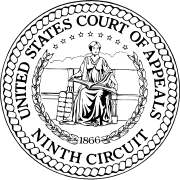| O'Bannon v. NCAA | |
|---|---|
 | |
| Court | United States Court of Appeals for the Ninth Circuit |
| Full case name | Edward C. O'Bannon, Jr., On Behalf of Himself and All Others Similarly Situated v. National Collegiate Athletic Association, aka The NCAA |
| Decided | September 30, 2015 |
| Citation | 802 F.3d 1049 |
| Case history | |
| Prior actions | O'Bannon v. Nat'l Collegiate Athletic Ass'n, 7 F. Supp. 3d 955 (N.D. Cal. 2014) |
| Appealed from | United States District Court for the Northern District of California |
| Appealed to | Supreme Court of the United States |
| Subsequent actions | Cert. denied, 137 S. Ct. 277 (2016) Motion for attorneys' fees granted, No. 4:09-cv-03329, 2016 WL 1255454 (N.D. Cal. Mar. 31, 2016), affirmed, 739 F. App'x 890 (9th Cir. 2018) |
| Court membership | |
| Judges sitting | Sidney R. Thomas, Jay S. Bybee, Gordon J. Quist |
| Case opinions | |
| Decision by | Bybee |
| Concur/dissent | Thomas |
O'Bannon v. NCAA, 802 F.3d 1049 (9th Cir. 2015), was an antitrust class action lawsuit filed against the National Collegiate Athletic Association (NCAA). The lawsuit, which former UCLA basketball player Ed O'Bannon filed on behalf of the NCAA's Division I football and men's basketball players, challenged the organization's use of the images and the likenesses of its former student athletes for commercial purposes. The suit argued that upon graduation, a former student athlete should become entitled to financial compensation for NCAA's commercial uses of their image.[1][2] The NCAA maintained that paying its athletes would be a violation of its concept of amateurism in sports.[3] At stake are "billions of dollars in television revenues and licensing fees."[4]
On August 8, 2014, District Judge Claudia Wilken found for O'Bannon, holding that the NCAA's rules and bylaws operate as an unreasonable restraint of trade, in violation of antitrust law.[5] The Court said it would separately enter an injunction regarding the specific violations found. In September 2015, the Ninth Circuit Court of Appeals affirmed, in part, and reversed, in part, the District Court's ruling.[6] In March 2016, O'Bannon's lawyers appealed the case to the Supreme Court of the United States.[7] The Supreme Court denied certiorari on October 3, 2016.[8]
- ^ Streeter, Kurt (July 22, 2009). "Former UCLA star Ed O'Bannon leads suit against NCAA over use of images". Los Angeles Times. Archived from the original on July 25, 2009. Retrieved August 1, 2013.
- ^ "Former Bruin O'Bannon sues NCAA". ESPN.go.com. Associated Press. July 21, 2009. Archived from the original on September 28, 2015. Retrieved August 1, 2013.
- ^ Pierce, Charles P. (June 20, 2014). "How It Ends". grantland.com. Archived from the original on June 20, 2014.
- ^ Cite error: The named reference
grantlandwas invoked but never defined (see the help page). - ^ O'Bannon v. NCAA, 7 F. Supp. 3d 955, 1009 (N.D. Cal. 2014) ("[T]he Court finds that this restraint does violate antitrust law").
- ^ O'Bannon v. NCAA, 802 F.3d 1049 (9th Cir. 2015).
- ^ Berkowitz, Steve (March 15, 2016). "O'Bannon plaintiffs ask Supreme Court to take case". USA Today. Archived from the original on March 26, 2016. Retrieved March 27, 2016.
- ^ O'Bannon v. NCAA, 137 S. Ct. 277 (2016).